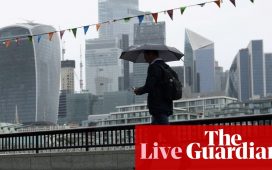Key events
Ex-Sainsbury’s boss Justin King appointed Ovo chair
Former Sainsburyâs boss Justin King has been appointed chair by the energy company Ovo, the UKâs fourth biggest supplier of electricity and gas. He will take up the role in March, replacing Stephen Murphy, who is stepping down after nine years with the company.
King also chairs the pan-European lottery group Allwynâs UK business, which recently took over from Camelot as the operator of the National Lottery, the first time the lottery has changed hands since its launch almost 30 years ago.
King has also held senior roles at Marks & Spencer and Asda.
JPMorgan economist Allan Monks said:
The PMI continues to defy expectations, with the flash for February showing yet another gain in the composite output reading from 52.9 to 53.3. The PMI has over-estimated growth for a while now. Even setting aside the realistic possibility of upward revisions to 2023 GDP, however, the survey has done a somewhat better job of tracking momentum swings.
With the PMI now 4.7 points from its September low and at its highest level since last April, signs that a first-half recovery is taking hold continue to build.
Some reaction to the UK PMI data from economists:
UK composite PMI out to its highest spread over Eurozone equivalent since Q2 2022. Consistent with economic growth picking up at the start of 2024 – albeit from a near-zero base for more than a year. pic.twitter.com/Y3Jph3pr4c
— Simon French (@Frencheconomics) February 22, 2024
UK PMI data point to GDP growth of 0.3% q/q in Q1, high business optimism in the outlook, and only a modest loss of momentum in the MPC’s underlying services CPI (chart). I still think sub-2% headline inflation from April enables a June rate cut, but it’s far from a done deal. pic.twitter.com/ImwZYOV5FV
— Samuel Tombs (@samueltombs) February 22, 2024
Joshua Mahony, chief market analyst at Scope Markets, has looked at the global equity rally. Nasdaq futures have jumped nearly 2%, pointing to a strong open later today.
Nvidia earnings appeared to have given global markets a new lease of life, as a huge surge in earnings brought a collective sigh of relief. Overnight gains for the Nikkei 225 saw the Japanese index surge into a fresh multi-decade high, laying the groundwork for a European session that has seen the DAX push into new highs this morning. With 85% of the S&P 500 having reported earnings, we have seen an impressive 3.2% earnings growth for the fourth quarter thus far.
Nvidiaâs number highlighted the companyâs ongoing position at the top dog in the AI world, with the forecast of another 230% rise in revenues for Q1 signalling that this train shows no signs of slowing down. This fresh source of revenues for the tech sector comes as an advantageous time, boosting equity markets throughout this period of monetary tightening. Thus, there is a hope that the so-called Magnificent seven can continue to provide a backstop for US markets until we are in a position where the Federal Reserve can drive down rates and spark a fresh bout of economic growth.
Early gains for European currencies have faltered somewhat, following a mixed set of PMI surveys that saw the manufacturing sector recovery take an unwelcome step backwards. In particular, traders will be particularly focusing on the worrying 42.3 manufacturing PMI figure out of Germany, driving the composite economy-wide reading into its eight consecutive contraction. While recent months had brought a glimmer of hope, todayâs survey highlights the European Central Bankâs need to step in as soon as possible.
The âMagnificent sevenâ refers to the US tech giants Apple, Amazon, Alphabet, Meta, Microsoft, Nvidia and Tesla.
In a research note on Tuesday, Deutsche Bank analysts said that the Magnificent 7â²s combined market cap would make it the second-largest country stock exchange in the world.
Of the G20 countries excluding the US, only China and Japan (and the latter, only just) have greater profits when their listed companies are combined.
Recession may soon be over but lingering price pressures may continue to concern the Bank of England, said Alex Kerr, assistant economist at Capital Economics. Even so, he believes the Bank will start cutting interest rates this summer.
The small rise in the composite activity PMI, from 52.9 in January to 53.3 in February, suggests that the mildest of mild recessions at the end of 2023 may soon be over. This suggests that the risks to our -0.1% q/q forecast for real GDP in Q1 lie to the upside.
The improvement in the composite activity PMI was driven by a rise in the manufacturing output balance from 45.5 to 47.3, which at face value still points to manufacturing output declining by 1.0% 3m/3m. The services activity balance remained unchanged at 54.3⦠the big picture is that GDP growth remains subdued.
Meanwhile, the shipping disruptions in the Red Sea led to a further lengthening in suppliersâ delivery times. But the manufacturing input prices balance actually decelerated from 52.5 to 52.3. This implies core goods CPI inflation will slow from 2.7% in January to around 0.0% later this year. However, the services output prices balance rose from 57.2 to 58.5, which survey respondents attributed to continued higher labour costs. This is consistent with services CPI inflation easing only gradually from 6.5% in January to just above 5.0% in six monthsâ time.
This will add to the Bank of Englandâs unease about lingering domestic price pressures. At the margin this may mean the Bank wonât rush to cut interest rates. But we still think overall CPI inflation will fall below 2.0% in April and that the Bank will be in a position to start cutting rates this summer.
UK economy puts recession behind it but price pressures remain high
The UK economy has kept up momentum and put the recent recession behind it, but inflation pressures remain high, suggesting the Bank of England will be cautious about cutting interest rates.
Business activity across the UK private sector in February expanded for the fourth consecutive month and at the fastest pace since last May, supported by another strong upturn in the service economy, the latest S&P Global Market Intelligence PMI survey showed.
February data highlighted a solid improvement in customer demand, as signalled by the sharpest rise in new work for nine months. Hopes of a sustained rebound in domestic economic conditions led to the highest level of optimism for the year ahead in two years.
Chris Williamson, chief business economist at S&P Global, said the survey indicates that the economy grew by 0.2% to 0.3% in the first three months of this year, after contracting in the previous two quarters.
Inflationary pressures remained elevated, though, and the rate of input price inflation edged up to its strongest since August, largely due to rising salaries in the service sector.
Manufacturers recorded only a modest rise in their input prices, despite higher shipping costs and worsening supply chain disruptions in the wake of the Red Sea crisis. The latest lengthening of suppliersâ lead times was the greatest recorded since July 2022.
-
Flash UK PMI Composite Output Index at 53.3 (Jan: 52.9). 9-month high.
-
Flash UK Services PMI Business Activity Index at 54.3 (Jan: 54.3). Unchanged.
-
Flash UK Manufacturing Output Index at 47.3 (Jan: 45.5). 3-month high.
-
Flash UK Manufacturing PMI at 47.1 (Jan: 47.0). 3- month high.
Eurozone downturn eases in February
The downturn in the eurozone has eased as the service sector stabilised, but price pressures have picked up again, according to a closely-watched survey.
Business activity declined at the slowest rate for eight months in February, according to provisional PMI survey data from Hamburg Commercial Bank, as a stabilisation of output in services offset a further steep downturn in manufacturing.
Business confidence about the year ahead improved, hitting a ten-month high and prompting firms to raise staffing levels at a pace not seen since last July.
By country, a deepening contraction in Germany, where output dropped for an eighth month and at the fastest rate since last October, and sustained output fall in France (the decline was the smallest recorded since Franceâs downturn began last June) were countered by faster growth in the rest of the region.
Average input costs across the eurozone picked up for a second month to reach the highest level since May, and above the pre-pandemic long-run average. Service sector input cost inflation rose to a nine-month high and prices fell in manufacturing at the slowest rate for 11 months. Selling price inflation also accelerated, up for a fourth month running in February to hit the highest since last May.
-
HCOB Flash Eurozone Composite PMI Output Index at 48.9 (January: 47.9). 8-month high
-
HCOB Flash Eurozone Services PMI Business Activity Index at 50.0 (January: 48.4). 7-month high
-
HCOB Flash Eurozone Manufacturing PMI Output Index at 46.2 (January: 46.6). 2-month low
-
HCOB Flash Eurozone Manufacturing PMI at 46.1 (January: 46.6). 2-month low
Drugmaker Indivior plans to move primary share listing to US
Indivior, which makes opioid addiction treatments Suboxone and Sublocade, has started sounding out shareholders over plans to move its primary share listing to the US this year, while maintaining a secondary listing the UK.
Mark Crossley, the chief executive, said:
We are also excited to announce that we are initiating consultations with shareholders on potentially transitioning to a primary listing in the US in 2024 while maintaining a secondary listing in the UK.
This would be a blow to the London Stock Exchange, and the UK governmentâs efforts to attract and retain companies here.
Indivior reported 21% net revenue growth last year, driven by its Sublocade and Perseris drugs, and expanded its pipeline of potential treatments for substance use disorders. Sublocade is a prescription medicine used in adults to treat moderate to severe addiction to opioid drugs, while Perseris is used to treat schizophrenia in adults.
However, Indivior, and its former parent, the consumer goods giant Reckitt Benckiser, from which it was spun off in 2014, are embroiled in a lawsuit in Londonâs High Court.
In November, they urged the court to throw out a lawsuit over allegedly false marketing of Suboxone. They are facing a claim brought on behalf of hundreds of investors that could run to hundreds of millions of pounds.
Wirral Council in north-west England wants to bring a representative claim based on an alleged scheme to switch the market for Suboxone from tablets, which were about to lose patent protection in the US, to a film that is put under the tongue and dissolves.
Reckitt Benckiser and Indivior, which deny the allegations, want the case dismissed.
Wirral Council aruges that when Indivior was indicted in the US in 2019, in one of the few corporate prosecutions related to the US opioid crisis, the news wiped out more than £550m of its market value.
European shares hit all-time high on AI boom
As Japanese traders are partying like itâs 1989, with the Nikkei hitting a record high, European shares have also hit an all-time high. The rally in global shares has been triggered by optimism that the AI boom will continue, following stellar results from US chipmaker Nvidia last night.
Europeâs board Stoxx 600 index rose as high as 495.77 points, surpassing the 495.46 reached in January 2022, up almost 1% on the day.
The FTSE 100 index in London is just 10 points ahead at 7,670, with the aircraft engine maker Rolls-Royce the second-biggest riser, up 7.2%, after annual profits more than doubled and it forecast a further jump in profits this year.
The insurer Beazley is leading gains on the FTSE 100, trading 8.5% higher, after it said in an unscheduled update to the stock market that it will hand shareholders around $300m in a capital return after a strong performance in 2023.
It said its undiscounted combined ratio â a measure of underwriting performance in which a level below 100 indicates a profit â had improved from low-80s to mid-70s last year as a result of better than expected claims.
Analysts at Jefferies said:
Given the strong pricing environment, we expect that a portion of the improving claims experience is underlying (and therefore repeatable), and not just a result of lower catastrophe losses.
The company has also announced a $300m additional capital return, alongside its ordinary dividend. We had estimated a $175m buyback to be announced at the FY23 results. As rates begin to moderate, whilst earnings continue to be supported by strong pricing from recent years, we believe this opens the door for recurring capital returns in future years from Beazley. We currently forecast a $200m buyback per annuam for 2024-25.

Kalyeena Makortoff
Lloyds Banking Group has been forced to put aside £450m for potential fines and compensation for motor finance customers, after the UK regulator opened an investigation into whether consumers had been charged inflated prices for car loans.
The lender, which also owns the Bank of Scotland and Halifax brands, said there was âsignificant uncertaintyâ over the extent of any misconduct or loss to customers that could result in penalties or payouts.
It also said it was unclear when the Financial Conduct Authority might complete its investigation, creating further uncertainty for the high street lender. The consumer champion Martin Lewis said last month the investigation could lead to âthe new PPIâ â a reference to the multibillion-pound payment protection insurance scandal.
However, the charge did not weigh on the bankâs annual pre-tax profits, which rose 57% to £7.5bn compared with £4.8m a year earlier. The bank was helped by a 3% rise in net interest income â which accounts for the difference between what is paid to savers compared with what is charged to loans and mortgage customers â to £13.3bn.
Matt Britzman, equity analyst at Hargreaves Lansdown, said the £450m provision was lower than expected.
Lloyds delivered a decent set of results and a confident medium-term outlook. Stripping out the £450m provision, set aside as a buffer for any incoming charges from the FCA review into motor financing, and profit before tax was a decent beat. That was driven almost entirely by a release of credit impairments back into the profit line with better economic assumptions and a single-name creditor paying back a hefty chunk of debt.
On the FCA review, the £450m provision was less than some had feared but there will be question marks around how Lloyds has come to that figure. Lloyds has been honest in saying the outcome of the review is largely unknown. What we do know is that Lloyds is one of the more exposed banks should the FCA deem there was misconduct and customer loss.
He said there are reasons to be optimistic about UK banks:
UK domestic banks are unloved but thereâs reason to be optimistic, especially with valuations sitting where they are. Performance has clearly peaked, but there are several tailwinds yet to play out that could give room for upside beyond current consensus.
Loan default levels remain low and with the return of real wage growth, plus a stabilising housing market, consumers should remain resilient. At the same time, banks are seeing easing conditions in the mortgage market and what looks to be a peak in terms of consumers shifting to higher cost savings accounts. As these tailwinds ease, the power of the structural hedge can come through â think of this like a bond portfolio thatâs rolling on to higher yields over the next few years. Lloyds looks well placed to benefit from these improving trends.
Rolls-Royce sees further jump in 2024 profits
More on Rolls-Royce. The company, whose technology powers ships and submarines, as well as making engines for big commercial aircraft, forecast a further jump in 2024 profits. It said cost cutting plans to axe up to 2,500 jobs were âwell under wayâ.
Its chief executive Tufan Erginbilgiç, the former BP executive who took the helm a year ago, said:
We are unlocking our full potential as a high-performing, competitive, resilient, and growing Rolls-Royce.
The company made an underlying operating profit of £1.6bn for 2023, ahead of analystsâ forecasts of £1.4bn and its own guidance of between £1.2bn and £1.4bn, and up from £652m in 2022. For this year, it expects profit to rise by at least 6% to between £1.7bn and £2bn, again ahead of City estimates.
Rolls shares rocketed last year by more than 200%, making it the top performer in the FTSE 100, helped by a profit upgrade in July and an announcement in November that profits could quadruple by 2027.
Rolls plans to sell some of its power systems business, which is set to raise up to £1.5bn in gross proceeds by 2028. It is in advanced discussions to sell the lower power range engines division to Germanyâs Deutz, and has decided to exit electrical in the short term. The former relates to diesel engines and engine systems using Daimler technology.
Introduction: Japanâs Nikkei hits record high; Lloyds and Rolls-Royce profits surge
Good morning, and welcome to our rolling coverage of business, the financial markets and the economy.
Japanâs main stock index has hit an all-time closing high, ahead of the previous record set in 1989, surging on optimism about the AI boom spread by bumper results from the US chipmaker Nvidia.
The Nikkei rose 2.19% to end the day at 39,098.68. On the final trading day of 1989, it had closed at 38,915.87. The 34 years it has taken to regain its footing is a decade longer than it took Wall Street to recoup losses from the 1929 crash and Great Depression.
Tsutomu Yamada, senior market analyst at Abu Kabucom Securities in Tokyo, told Reuters:
For us traders, this markets the arrival of a new era. It feels like the stock market is telling us that weâve finally escaped from deflation and a new world has opened up.
This morning here in London, weâve had buoyant figures from Lloyds Banking Group and the aircraft engine maker Rolls-Royce. Lloydsâ annual pre-tax profits jumped 57% to £7.5bn, even though the UK bank put aside £450m for potential fines and compensation for motor finance customers, after the UK regulator opened a probe into whether consumers had been charged inflated prices for car loans. Profits at Rolls-Royce more than doubled last year to £1.6bn.
Last night, after US markets closed, Nvidia beat expectations again and reported sales of $22b.1n for the fourth quarter of last year, up 22% from the quarter before, and an eye popping 265% higher than in the same period the year before. And for the current quarter, it said it will deliver $24bn sales.
The chief executive and company founder Jensen Huang said:
Accelerated computing and generative AI have hit the tipping point. Demand is surging worldwide across companies, industries and nations.
Nvidia shares jumped 10% in after hours trading.
Josh Gilbert, market analyst at trading platform eToro, said:
Nvidia reasserted its place in the Magnificent 7 with another blowout quarter showing that AI use cases are exploding, and the AI boom is showing no signs of slowing down.
The big question for investors is, can this continue? Put simply, yes. Nvidia continues to deliver in every way, and its results show there is still plenty of growth ahead. This isnât just a flash in the pan, nor a bubble, but a business that continues to make serious cash.
Despite the risks from issues in China and ongoing competition, that can pose headwinds moving forward, Nvidia raised its guidance for the next quarter to $24bn in revenue, putting it on track to nearly $100bn in sales over the next year.
Also last night, the US Federal Reserveâs minutes of its last meeting showed that policymakers were not eager to cut interest rates at that meeting, and expressed optimism and caution on inflation. They also modified the post-meeting statement to signal that rate cuts would only occur when the federal open market committee had âgreater confidenceâ that inflation was diminishing.
Stephen Innes, managing partner at SPI Asset Management, said:
Sure, the minutes were a tad outdated, but they certainly skewed much more cautiously than when [Fed president Jerome] Powell told reporters late last month that a March rate cut was still possible, at least in the marketâs view.
The Agenda
-
8.15am-9am GMT: HCOB PMI flash for February for France, Germany, eurozone
-
9.30am GMT: UK S&P global PMI flash for February
-
10am GMT: Eurozone inflation for January (forecast: 2.8%)
-
12.30pm GMT: European Central Bank monetary policy meeting accounts
-
1.30pm GMT: US Initial jobless claims for week of 17 February
-
2.45pm GMT: US S&P Global PMI flash for February











